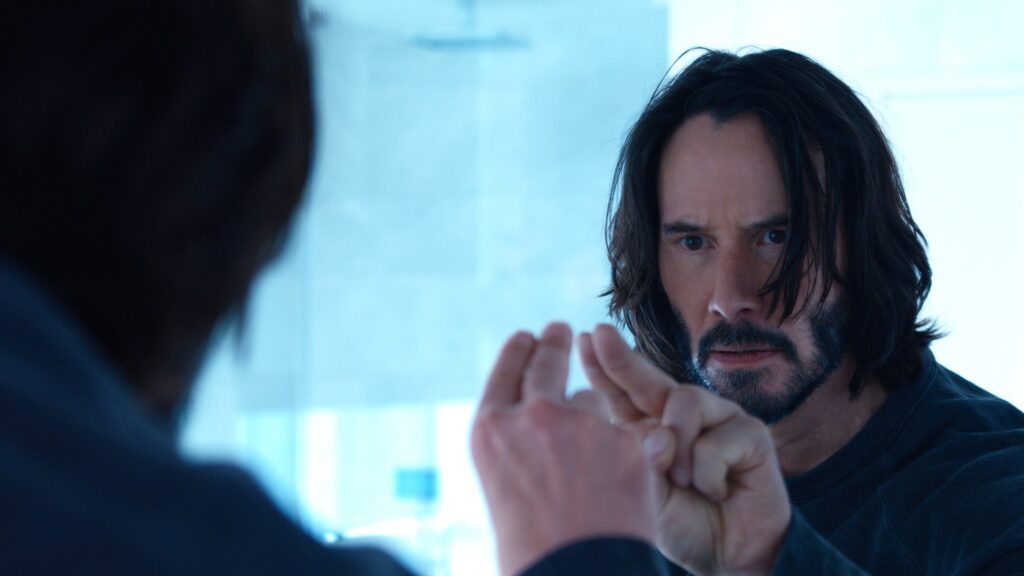The Matrix Resurrections is too meta for its own good
Written by Ian Thomas Malone, Posted in Blog, Movie Reviews, Pop Culture
The past twenty years have tipped the real world toward the Matrix in ways no one could have imagined in 1999. Much has been made of the transgender themes present in the Wachowski’s original work, a community that’s largely benefited from our changing society. The Matrix is a world where people can bend the very construct of reality to their will, something that modern medicine has afforded to those seeking transition.
Over the course of their post-Matrix careers, the Wachowski’s have often tried to bend the landscape of modern blockbusters to their will. In a world full of derivative sequels and reboots, films like Cloud Atlas and Jupiter’s Legacy dared to get weird. However one feels about the end results, especially in the latter’s case, there is much to enjoy in the way the Wachowski’s dared to be different.
The Matrix Resurrections, Lana Wachowski’s first solo film without her sister Lily, had the power to reinvent the modern blockbuster, an art form that’s quite resistant to the queer undertones that permeate through the science fiction genre. Instead, Wachowski’s efforts to subvert her previous work ended up embodying many of the same tropes that plague practically every major franchise. What should have been a triumph of the present instead found itself solely consumed by the past.
The biggest problem with the film is its inability to ever really progress past first-act territory. The long-awaited return of Neo gives Keanu Reeves ample room to shine, but Resurrections never stops basking in his glory long enough to let him add to the canon. Reeves often feels like a spectator in his own film, a dynamic that might have worked better if he was there to pass the baton to a future star.
The same largely holds true for Trinity. Carrie-Anne Moss played as pivotal a role in the success of the first Matrix as Reeves, but Resurrections largely reduces Trinity to the mere object of Neo’s subconscious affection, a dynamic exacerbated by the film’s meandering attention span. Frequent flashbacks to the first film serve as little more than a distraction, reminding viewers of their ability to simply watch that one instead.
Resurrections’ fascination with meta-commentary might have worked if Wachowski had been able to rein herself in a bit. Newcomers Neil Patrick Harris and Jonathan Groff look like they’re having the time of their lives as they deconstruct the very nature of sequels, but those kinds of scenes are supposed to be icing on the cake, not the cake itself. Wachowski’s ability to poke fun at Hollywood’s sequel industrial complex falls flat in the midst of a film that is itself not very entertaining.
The new cast perform their roles admirably. There’s a lot of exposition dedicated to the crew of the Mnemosyne, led by captain Bugs (Jessica Henwick), that doesn’t accomplish much other than padding an already-long 148-minute runtime. The actors all look like they’re having the time of their lives, which would be easier to get behind if it was in service to a better plot.
Audience members might be miffed that Lawrence Fishburne wasn’t asked back, owing to Morpheus’s death in the seemingly-canon game The Matrix Online. Yahya Abdul-Mateen II absolutely crushes the role, a performance full of intrigue that pays ample homage to Fishburne. Problem is, this movie doesn’t know what to do with Morpheus. You could literally trim all his scenes out and change nothing about the narrative, a bizarre way to handle one of the franchise’s most important characters.
The fatal undoing of The Matrix Resurrections largely stems from a point it concedes in the narrative. The film would exist whether Wachowski returned or not. There is some sense in the rationale that a Wachowski-directed Matrix might be better than a Wachowski-less Matrix, but that point alone isn’t enough to justify the existence of the former. Inevitability is not a key component of quality.
The third act is atrocious, lacking the innovative stunts that defined the first trilogy. For all the scorn thrown at the original two sequels, at least Reloaded introduced ample new terrain for the choreographers to explore. Like its narrative, Resurrections doesn’t bring anything new to the table.
LGBTQ people rarely have such a prominent seat at the table of blockbuster franchises. Representation isn’t really enough. It can’t be. Trans people hear all the time about how bright the future will be.
You can’t have a vibrant tomorrow if your present is so squarely focused on the past. The Matrix Resurrections has no purpose beyond stoking nostalgia. It’s unclear if a fresh director might’ve been able to craft a better film in this universe. Unfortunately Wachowski set the bar so low that it’s hard to imagine anyone making a worse mockery of such a beloved franchise.











